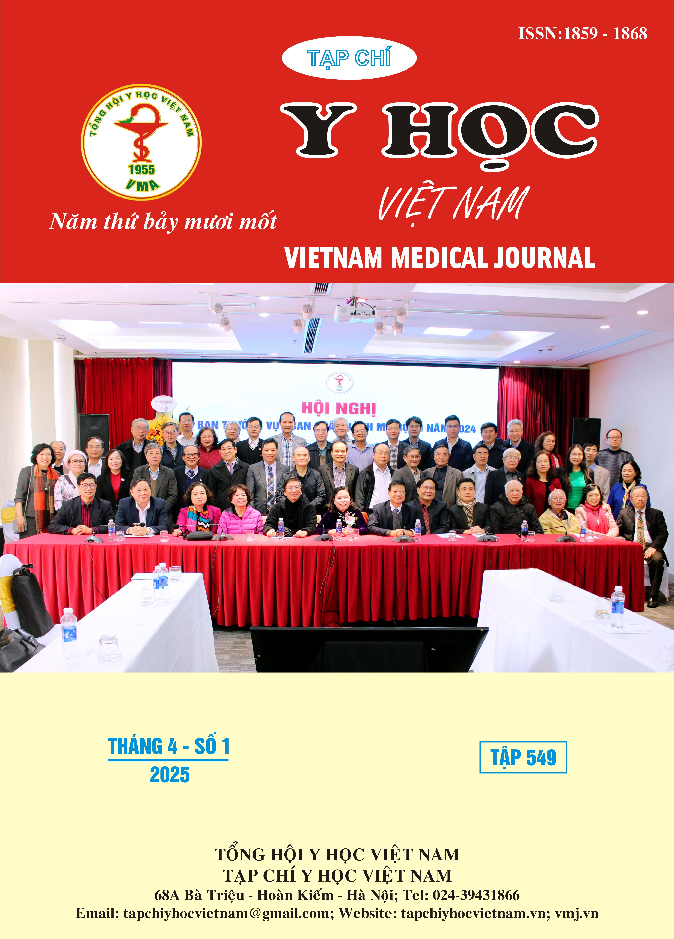CHẤT LƯỢNG CUỘC SỐNG VÀ MỘT SỐ YẾU TỐ LIÊN QUAN Ở NGƯỜI BỆNH VIÊM LOÉT ĐẠI TRỰC TRÀNG CHẢY MÁU NHẬP VIỆN
Nội dung chính của bài viết
Tóm tắt
Mục tiêu: Mô tả chất lượng cuộc sống và một số yếu tố liên quan của người bệnh viêm loét đại trực tràng chảy máu. Đối tượng và phương pháp: Mô tả cắt ngang trên 38 người bệnh viêm loét đại trực tràng chảy máu điều trị nội trú tại Trung tâm Tiêu hóa - Gan mật, Bệnh viện Bạch Mai và khoa Nội tổng hợp, Bệnh viện Đại học Y Hà Nội từ tháng 8/2019 đến tháng 8/2020. Tất cả người bệnh được phỏng vấn bộ câu hỏi chất lượng cuộc sống IBDQ –32. Kết quả: Người bệnh chủ yếu thuộc nhóm tuổi trên 40 với tỉ lệ 65,8%, nữ nhiều hơn nam với tỉ lệ xấp xỉ 1,3/1. Điểm trung bình IBDQ – 32 là 120,63±24,52, trong đó, nhóm triệu chứng ruột (B) là 36,73±8,68; nhóm sức khỏe toàn thân (S) là 15,21±4,88; nhóm chức năng xã hội (SF) là 19,73±6,22; nhóm cảm xúc (E) là 48,94±9,62. Có mối liên quan giữa điểm chất lượng cuộc sống và số lần đại tiện trong ngày, điều trị steroid, trong đó, số lần đại tiện trên 6 lần và có điều trị steroid có chất lượng cuộc sống thấp hơn (p<0,05). Điểm chất lượng cuộc sống của người bệnh lúc nhập viện có tương quan nghịch biến với mức độ nặng theo thang điểm Mayo, số triệu chứng của bệnh nhân và số lần đại tiện trong ngày với p<0,05. Kết luận: Chất lượng cuộc sống ở cả 2 giới nam và nữ là như nhau, thấp nhất ở nhóm tuổi 40-49, mức độ bệnh nặng, và có mối tương quan nghịch biến với số lần đại tiện, số triệu chứng của người bệnh và điểm Mayo.
Chi tiết bài viết
Từ khóa
Viêm loét đại trực tràng chảy máu, chất lượng cuộc sống, IBDQ-32
Tài liệu tham khảo
2. Masachs M, Casellas F, Malagelada J. Spanish translation, adaptation, and validation of the 32-item questionnaire on quality of life for inflammatory bowel disease (IBDQ-32). Revista espanola de enfermedades digestivas: organo oficial de la Sociedad Espanola de Patologia Digestiva. 2007;99(9):511-519.
3. Dubinsky M, Rice A, Yarlas A, et al. Systematic Literature Review: Ability of the IBDQ-32 to Detect Meaningful Change in Ulcerative Colitis Health Indicators. Inflamm Bowel Dis. 2024;30(11):2115-2126. doi:10.1093/ibd/izad282.
4. Zavala-Solares MR, Salazar-Salas L, Yamamoto-Furusho JK. Validity and reliability of the health-related questionnaire IBDQ-32 in Mexican patients with inflammatory bowel disease. Gastroenterol Hepatol. 2021;44(10):711-718. doi:10.1016/j.gastrohep.2021.03.002.
5. van der Eijk I, Stockbrügger R, Russel M. Influence of quality of care on quality of life in inflammatory bowel disease (IBD): literature review and studies planned. European journal of internal medicine. 2000;11(4):228-234.
6. Ngô Gia Mạnh. Nghiên cứu ứng dụng thang điểm mayo trong viêm loét đại trực tràng chảy máu. Hà Nội, Trường Đại học Y Hà Nội; 2018.
7. Kornbluth A, Sachar DB, Gastroenterology PPCotACo. Ulcerative colitis practice guidelines in adults: American college of gastroenterology, practice parameters committee. Official journal of the American College of Gastroenterology| ACG. 2010;105(3):501-523.
8. Panés J, Su C, Bushmakin AG, Cappelleri JC, Mamolo C, Healey P. Randomized trial of tofacitinib in active ulcerative colitis: analysis of efficacy based on patient-reported outcomes. BMC gastroenterology. 2015;15:1-10.
9. Sainsbury A, Heatley R. Psychosocial factors in the quality of life of patients with inflammatory bowel disease. Alimentary pharmacology & therapeutics. 2005;21(5):499-508.


